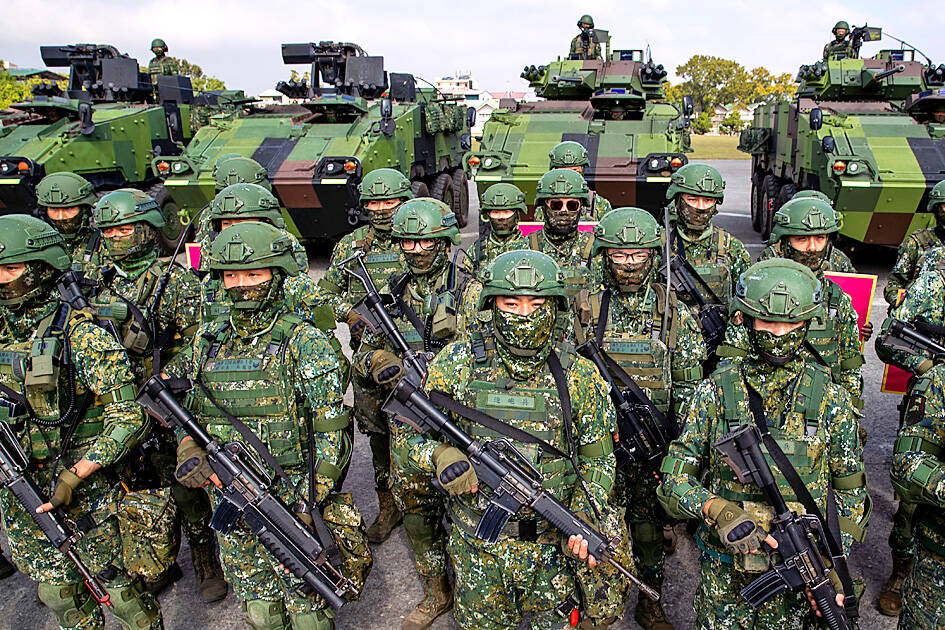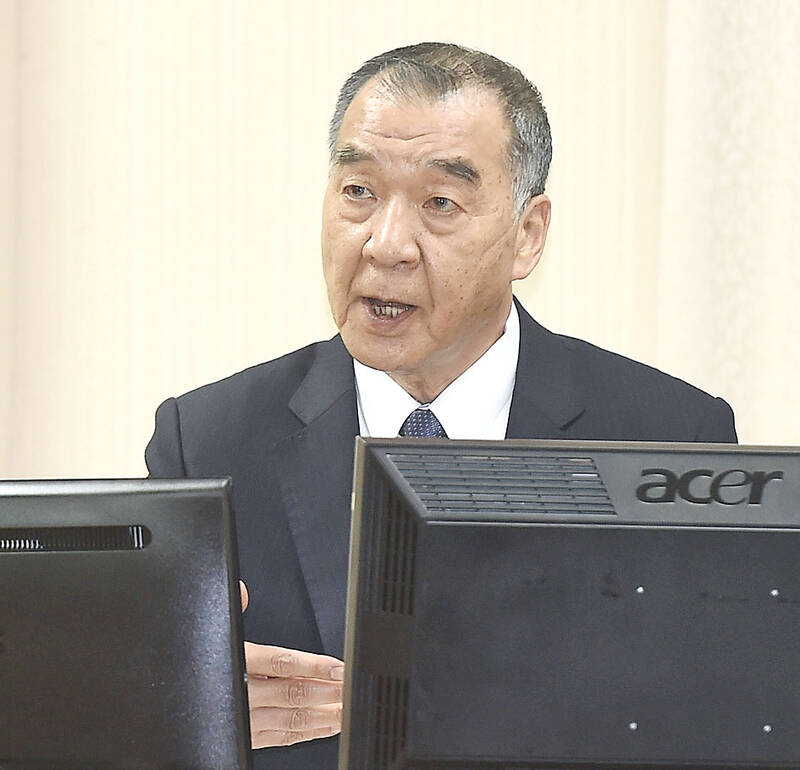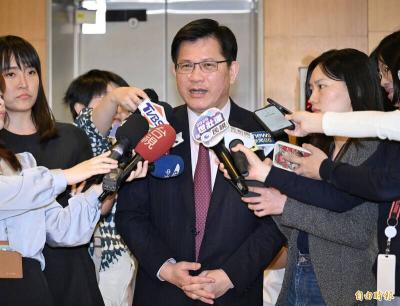Taiwan could survive a Chinese military assault unaided for two weeks if sufficient reserves were prepared for its defense, Minister of National Defense Chiu Kuo-cheng (邱國正) said.
“There is no need to debate whether the Chinese military is stronger and larger than Taiwan’s. Although it is big enough to start a war, it is not capable of defeating Taiwan in two weeks,” Chiu told the Chinese-language CommonWealth Magazine in an interview published on Tuesday.
“Even if China wins, it will be unable to impose autocratic rule in a year, two years or even more than that, because Taiwanese are free people and will not tolerate being governed by a one-party state,” Chiu said.

Photo: RITCHIE B. TONGO, EPA
When asked what lessons Taiwan can learn from the Russian invasion of Ukraine, Chiu said that ongoing conflict underscored the importance of maintaining preparedness at peacetime.
Unlike the Russian invasion of Ukraine, which is being waged in distinct battle zones, Taiwan would in a conflict become a continuous theater of operations without clearly defined front lines or rear areas. Chiu added.
“Chinese aircraft carriers would likely be deployed in the seas to Taiwan’s east, not so much to launch attacks against Taiwan from the east coast, but to block other forces from intervening,” he said.

Photo: Chien Jung-feng, Taipei Times
Although China is more likely to deploy its aircraft carriers as a blocking force in the seas east of Taiwan, a naval threat on the east coast cannot be entirely discounted, which means the nation must not depend solely on the supply depots in the region to survive a blockade, he said.
“[Taiwan] absolutely can outlast a blockade given that we prepare sufficient materiel, and that communications with the outside world are maintained via the myriad means available to us, including the Internet and telecommunications technology,” he said.
Regarding asymmetric warfare, Chiu said the military should procure light defensive weapons that provide the capability to defeat tanks, airplanes and ships for their deterrence value.
These capabilities should form only a part of the arsenal of the nation’s armed forces, while the air, sea and land forces’ ability to operate heavy weapons and large units remain essential to defense, he said.
When asked about the increase of military exchanges from other countries, Chiu said the rise in Chinese activities in the economic, trade and technological domains has alarmed other nations and incentivized them to gain more understanding of Beijing through ties with Taiwan.
“We are simultaneously conducting exchanges with other countries to gain information from their participation in international organizations,” he said, adding that “we seek to cooperate in mutually beneficial ways with countries that can help defend Taiwan whenever the opportunity arise.”
“I have been in the military for close to forty or fifty years. I am against war … war can only end in grim victories and defeats,” he said. “War is the continuation of politics through other means, which represents failure of politics. We seek to strengthen our defense, not provoke war by giving China excuses.”

Taiwan would welcome the return of Honduras as a diplomatic ally if its next president decides to make such a move, Minister of Foreign Affairs Lin Chia-lung (林佳龍) said yesterday. “Of course, we would welcome Honduras if they want to restore diplomatic ties with Taiwan after their elections,” Lin said at a meeting of the legislature’s Foreign Affairs and National Defense Committee, when asked to comment on statements made by two of the three Honduran presidential candidates during the presidential campaign in the Central American country. Taiwan is paying close attention to the region as a whole in the wake of a

President William Lai (賴清德) has appointed former vice president Chen Chien-jen (陳建仁) to attend the late Pope Francis’ funeral at the Vatican City on Saturday on his behalf, the Ministry of Foreign Affairs said today. The Holy See announced Francis’ funeral would take place on Saturday at 10am in St Peter’s Square. The ministry expressed condolences over Francis’ passing and said that Chen would represent Taiwan at the funeral and offer condolences in person. Taiwan and the Vatican have a long-standing and close diplomatic relationship, the ministry said. Both sides agreed to have Chen represent Taiwan at the funeral, given his Catholic identity and

Chinese Nationalist Party (KMT) Chairman Eric Chu (朱立倫), spokeswoman Yang Chih-yu (楊智伃) and Legislator Hsieh Lung-chieh (謝龍介) would be summoned by police for questioning for leading an illegal assembly on Thursday evening last week, Minister of the Interior Liu Shyh-fang (劉世芳) said today. The three KMT officials led an assembly outside the Taipei City Prosecutors’ Office, a restricted area where public assembly is not allowed, protesting the questioning of several KMT staff and searches of KMT headquarters and offices in a recall petition forgery case. Chu, Yang and Hsieh are all suspected of contravening the Assembly and Parade Act (集會遊行法) by holding

Taiwan would welcome the return of Honduras as a diplomatic ally if the next president of that country decides to make such a move, Minister of Foreign Affairs Lin Chia-lung (林佳龍) said today. “We would welcome Honduras if they want to restore diplomatic ties with Taiwan after their elections,” Lin said during a legislative hearing. At the same time, Taiwan is paying close attention to the Central American region as a whole, in the wake of a visit there earlier this year by US Secretary of State Marco Rubio, Lin said. Rubio visited Panama, El Salvador, Costa Rica and Guatemala, during which he